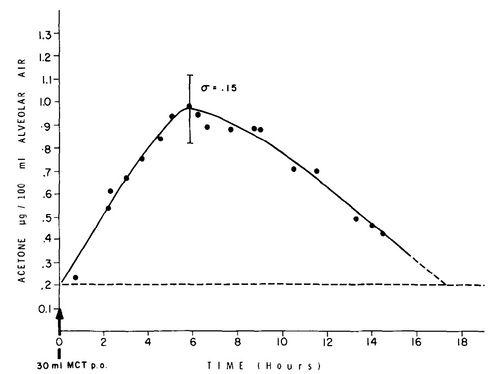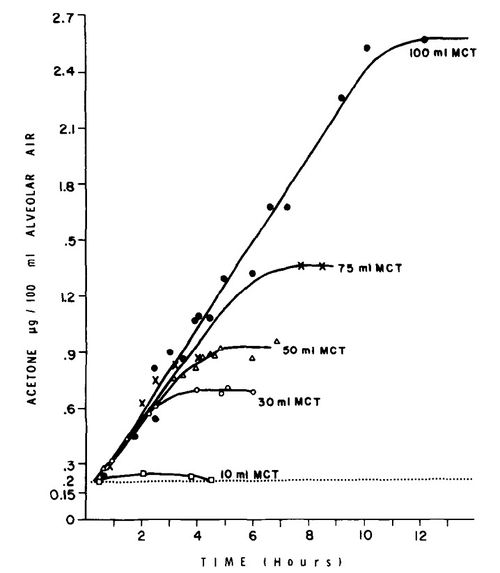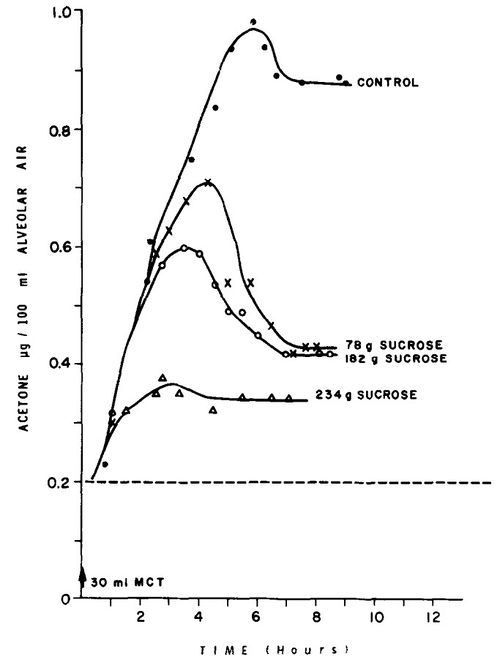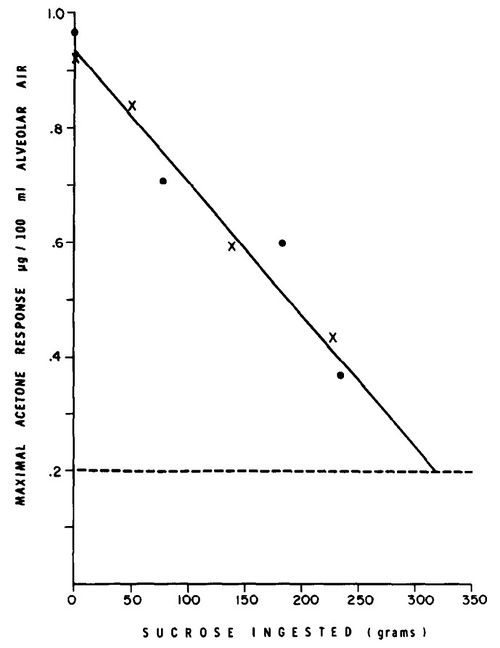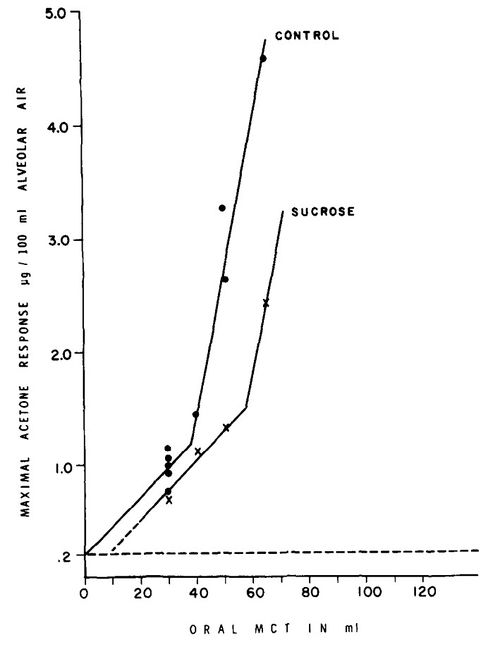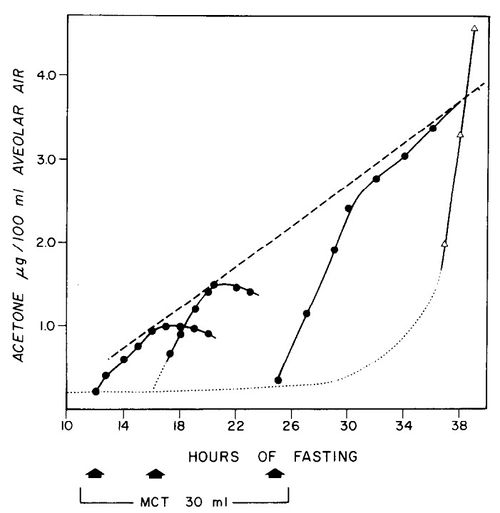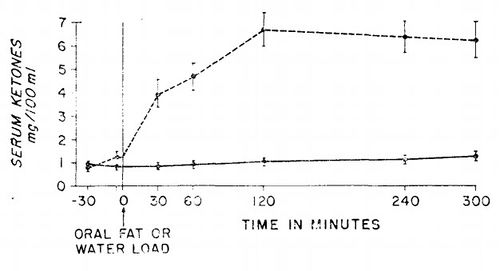Difference between revisions of "MCT"
User:Fellrnr (User talk:Fellrnr | contribs) |
User:Fellrnr (User talk:Fellrnr | contribs) |
||
| Line 1: | Line 1: | ||
| − | Medium Chain Triglycerides (MCTs) are fats that are shorter in length than most normal dietary fats (Long Chain Triglycerides or LCTs). MCTs are found in coconut oil, palm kernel oil and butter, as well as being available in pure form. MCT produces [[Ketones]] even without being part of a [[Low Carbohydrate Diets| Low Carbohydrate Diet]]. | + | {{DISPLAYTITLE:MCT - Medium Chain Triglycerides}} |
| + | Medium Chain Triglycerides (MCTs) are fats that are shorter in length than most normal dietary fats (Long Chain Triglycerides or LCTs). MCTs are found in coconut oil, palm kernel oil and butter, as well as being available in pure form. | ||
| + | * MCT produces [[Ketones]] even without being part of a [[Low Carbohydrate Diets| Low Carbohydrate Diet]]. | ||
| + | ** Ketone levels are higher when on a Low Carbohydrate Diet. | ||
| + | ** Carbohydrate consumption with the MCT will reduce ketone levels. | ||
| + | ** Higher intake of MCT will produce higher ketone levels. | ||
| + | ** Fasting will increase ketone levels from MCT. | ||
| + | * MCT can produce nausea, vomiting, stomach cramps and diarrhea. Adaptation and mixing with other foods can reduce the problems. | ||
| + | * There are initial indications that MCT will reduce the symptoms of Alzheimer's and other memory problems. | ||
{{Skeleton}} | {{Skeleton}} | ||
=MCT and the Ketogenic Diet= | =MCT and the Ketogenic Diet= | ||
Because MCT will increase [[Ketones|Ketone Levels]] without needing [[Low Carbohydrate Diets| Carbohydrate restriction]], they are often used for [[Ketogenic Diets for Epilepsy| epilepsy treatment]]. Small amounts of MCT can be used to increase the ketone levels, or to reduce elevated cholesterol levels while on the Ketogenic Diet<ref name="Kossoff-2011-1809"/>. Larger amounts of MCT are the basis of the [[MCT Diet]], which allow for a greater carbohydrate intake than the traditional [[Ketogenic Ratio Diet]] and therefore more food choices. | Because MCT will increase [[Ketones|Ketone Levels]] without needing [[Low Carbohydrate Diets| Carbohydrate restriction]], they are often used for [[Ketogenic Diets for Epilepsy| epilepsy treatment]]. Small amounts of MCT can be used to increase the ketone levels, or to reduce elevated cholesterol levels while on the Ketogenic Diet<ref name="Kossoff-2011-1809"/>. Larger amounts of MCT are the basis of the [[MCT Diet]], which allow for a greater carbohydrate intake than the traditional [[Ketogenic Ratio Diet]] and therefore more food choices. | ||
| + | =MCT Cost= | ||
| + | MCT is expensive. I've used pure MCT products like [http://www.amazon.com/gp/product/B000GK11HK Premium MCT Gold] and [http://www.amazon.com/gp/product/B0019LWIOU Dr. Bernd Friedlander MCT Oil], and they are all around $1/oz. You can buy coconut oil, which is about 60% MCT (see below for details), but products like [http://www.amazon.com/gp/product/B001EO5Q64 Nutiva Organic Extra Virgin Coconut Oil] are about $0.50/oz, which works out around the same price. (Note that products like [http://www.amazon.com/Twinlab-Fuel-Orange-Fluid-Ounce/dp/B001G7R6IU TwinLab Mct Fuel] contain only about 50% MCT.) | ||
=MCT and Ketone Levels= | =MCT and Ketone Levels= | ||
| − | A study | + | A 1969 study looked at how ketone levels changed with MCT<ref name="Freund-1966"/>. Subjects were non-obese healthy adults, mostly on a high carbohydrate diet who did not perform any exercise beyond slow walking after taking the MCT. Unless otherwise stated, the subjects consumed only water after taking the MCT. The study measured breath acetone, which is likely to peak sometime after blood AcAc or BOHB levels. (Note that from another study<ref name="Musa-Veloso-2006"/>, Acetone at 1.0 µg/100ml breath might indicate blood ketones of BOHB 1.5 mmol/L and AcAc of 0.7 mmol/L, 5.0 µg/100ml might be BOHB 2.7 mmol/L and AcAc of 1.4 mmol/L. See below for details.) |
| − | =MCT | + | {| class="wikitable" |
| − | + | |- valign="top" | |
| + | |[[File:Freund-1966-SingleDose.jpg|none|thumb|500px|This is the time course of a single 30ml dose of MCT. You can see the peak occurs after 6 hours, though the blood AcAc levels probably peak sometime earlier.]] | ||
| + | |[[File:Freund-1966-DoseResponse.jpg|none|thumb|500px|The effects of different doses of MCT on breath acetone. The 10, 30, 50, and 75ml doses produced a linear, proportional increase in Ketones, but the 100ml is disproportionately large. Also note that the peak occurs later for larger doses.]] | ||
| + | |- valign="top" | ||
| + | |[[File:Freund-1966-Sucrose.jpg|none|thumb|500px|Even though MCT produces ketones without carbohydrate restriction, it is clear from this graph that carbohydrate taken at the same time as the MCT will inhibit ketone production. Note that from a low carbohydrate perspective, this is quite a lot of sucrose that is ingested.]] | ||
| + | |[[File:Freund-1966-SucroseDoseResponse.jpg|none|thumb|500px|This shows the linear relationship between maximum breath acetone and the sucrose dose.]] | ||
| + | |- valign="top" | ||
| + | |[[File:Freund-1966-MCTSucroseDoseResponse.jpg|none|thumb|500px|The effect of 78g of sucrose on the dose/response of MCT on Ketones. The sucrose reduces ketone levels for all doses of MCT, but the effect is greater at higher MCT levels.]] | ||
| + | |[[File:Freund-1966-Fasting.jpg|none|thumb|500px|The effect of fasting on response to 30ml MCT. The dotted line and triangles show the ketone levels from fasting alone. The ketone levels in response to MCT are larger after fasting, and the study noted that a low carbohydrate response resulted in a larger ketone response than a mixed diet. (There was only one subject on a low carbohydrate diet, so no statistical inference can be drawn.)]] | ||
| + | |} | ||
| + | A study showed that giving 40ml of MCT raised blood BOHB levels to 0.43-0.68 mmol/L<ref name="RegerHenderson2004"/>. Another study showed that 1mg/Kg body weight of MCT raised blood ketone levels to 0.4 mmol after 30 minutes and 0.8 after 120 minutes, falling to 0.7 after 300 minutes<ref name="Pi-Sunyer-1969"/>: | ||
| + | [[File:MCTKetones1969.jpg|none|thumb|500px|The ketone levels after 1mg/Kg body weight. The units are in mg/dl, so divide by 10 to get the more usual mmol (both BOHB and AcAc have similar conversion ratios).]] | ||
| + | ==Calculating Blood Ketone Levels from Breath Acetone== | ||
| + | A study looked at the correlation between breath acetone and blood ketone levels<ref name="Musa-Veloso-2006"/>. The results indicated the following relationships between breath acetone in nmol/L and blood ketone levels in mmol/L. | ||
| + | * Acetoacetate (AcAc): Y = AX<sup>B</sup> + C, where A = 3.4884, B = 0.0803, C = -4.6065. | ||
| + | * Hydroxybutyrate (BOHB): Y = AX<sup>B</sup> + C, where A = 5.1365, B = 0.0864, C= -6.5048. | ||
| + | * Acetone: Y = AX<sup>B</sup> + C, where A = 2.2177, B = 0.1900, C = -5.6040. | ||
| + | To convert from µg/100ml used above to nmol/L: | ||
| + | * 1 ug/100 ml is 0.001 mg/dL. | ||
| + | * 0.001 mg/dL is 0.000172 mmol/L. | ||
| + | * 0.000172 mmol/L is 172 nmoml/L. | ||
| + | Plugging this conversion into the above equations, we get: | ||
| + | {| class="wikitable" | ||
| + | ! ug/100 ml | ||
| + | ! mg/dL: | ||
| + | ! mmol/L: | ||
| + | ! nmoml/L | ||
| + | ! BOHB | ||
| + | ! AcAc | ||
| + | ! Acetone | ||
| + | ! Total | ||
| + | |- | ||
| + | | 1.0 | ||
| + | | 0.001 | ||
| + | | 0.000172 | ||
| + | | 172 | ||
| + | | 1.5 | ||
| + | | 0.7 | ||
| + | | 0.3 | ||
| + | | 2.5 | ||
| + | |- | ||
| + | | 2.0 | ||
| + | | 0.002 | ||
| + | | 0.000344 | ||
| + | | 344 | ||
| + | | 2.0 | ||
| + | | 1.0 | ||
| + | | 1.1 | ||
| + | | 4.1 | ||
| + | |- | ||
| + | | 3.0 | ||
| + | | 0.003 | ||
| + | | 0.000516 | ||
| + | | 516 | ||
| + | | 2.3 | ||
| + | | 1.2 | ||
| + | | 1.7 | ||
| + | | 5.1 | ||
| + | |- | ||
| + | | 4.0 | ||
| + | | 0.004 | ||
| + | | 0.000688 | ||
| + | | 688 | ||
| + | | 2.5 | ||
| + | | 1.3 | ||
| + | | 2.1 | ||
| + | | 5.9 | ||
| + | |- | ||
| + | | 5.0 | ||
| + | | 0.005 | ||
| + | | 0.00086 | ||
| + | | 860 | ||
| + | | 2.7 | ||
| + | | 1.4 | ||
| + | | 2.4 | ||
| + | | 6.5 | ||
| + | |} | ||
=MCT and digestive distress= | =MCT and digestive distress= | ||
MCT frequently causes digestive problems, including nausea, vomiting, stomach cramps and diarrhea. There may be several factors that influence the level of digestive distress<ref name="WolinskyDriskell2004"/>: | MCT frequently causes digestive problems, including nausea, vomiting, stomach cramps and diarrhea. There may be several factors that influence the level of digestive distress<ref name="WolinskyDriskell2004"/>: | ||
| Line 13: | Line 99: | ||
* '''Other Foods'''. Consuming MCT with other foods reduces the digestive distress. | * '''Other Foods'''. Consuming MCT with other foods reduces the digestive distress. | ||
Personally, I found that even after weeks of taking MCT, I could not consume it on its own without incurring dramatic digestive problems. Mixing MCT with other foods greatly reduced, but did not completely remove, the issues. | Personally, I found that even after weeks of taking MCT, I could not consume it on its own without incurring dramatic digestive problems. Mixing MCT with other foods greatly reduced, but did not completely remove, the issues. | ||
| + | =MCT and Athletic Performance= | ||
| + | To follow. | ||
| + | =MCT and Hypoglycemia= | ||
| + | To Follow. | ||
=MCT and Alzheimer's= | =MCT and Alzheimer's= | ||
There is evidence that MCT can help reduce peoples' memory impairment without carbohydrate restriction<ref name="RegerHenderson2004"/>. A study using elderly dogs showed a long lasting improvement in cognitive ability with MCT supplementation<ref name="PanLarson2010"/>. There are other anecdotal reports of MCT helping with Alzheimer's symptoms<ref name="www.tampabay.com"/>. | There is evidence that MCT can help reduce peoples' memory impairment without carbohydrate restriction<ref name="RegerHenderson2004"/>. A study using elderly dogs showed a long lasting improvement in cognitive ability with MCT supplementation<ref name="PanLarson2010"/>. There are other anecdotal reports of MCT helping with Alzheimer's symptoms<ref name="www.tampabay.com"/>. | ||
| Line 69: | Line 159: | ||
| 8.3 | | 8.3 | ||
|} | |} | ||
| + | =MCT, Calorific Value and Weight Gain= | ||
| + | An animal study has shown that overfeeding that includes large quantities of MCT produced 20% less weight gain than the same level of overfeeding with LCT<ref name="Geliebter-1983"/>. The rats were fed a diet of 50% of calories as fat, with the MCT diet providing 45% of calories from MCT. The rats had similar levels of activity and insulin. This may because MCTs are raise body temperature (thermogenesis)<ref name="Mascioli-1991"/>. MCT has is often considered to have a slightly lower calorie density of 8.3 Calories/gram compared with 9.1 Calories/gram for LCT<ref name="IngleDriedger1999"/>. However, if thermogenesis is taken into account, a value of 6.72 Calories/gram would be more appropriate<ref name="IngleDriedger1999"/>. This may be critical when using the [[MCT Diet]] if calorie intake is restricted. Given the density of MCT is 0.93 - 0.96 grams/ml<ref name="density"/>, 15ml of MCT would be | ||
=MCT Safety= | =MCT Safety= | ||
MCT is considered safe at 1mg/Kg of body weight, and MCT has been shown as effectively non-toxic in high dose animal studies<ref name="TraulDriedger2000"/>. | MCT is considered safe at 1mg/Kg of body weight, and MCT has been shown as effectively non-toxic in high dose animal studies<ref name="TraulDriedger2000"/>. | ||
| + | =My Experiences with MCT= | ||
| + | * I've found that taking MCT on its own will often produce digestive problems, including nausea and apocalyptic diarrhea. Mixing MCT with other foods can reduce the problems, and I'll take MCT with cream or other foods. | ||
| + | * I found that MCT in larger doses (3+ tablespoons) can produce obvious thermogenesis, resulting in the perception that a cold room is actually overly warm. There is also a sensation of warmth radiating from my stomach, rather like I'd just consumed strong alcohol. | ||
| + | * There seem to be changes in mental functioning, especially with larger doses. MCT can alleviate some feelings of tiredness and improve mental acuity, but it can also result in an unpleasant feeling that is hard to describe. The sensation is a little like how I feel when a migraine is imminent. | ||
{{KetoSeeAlso}} | {{KetoSeeAlso}} | ||
=References= | =References= | ||
<references> | <references> | ||
| + | <ref name="density">http://www.sternchemie.de/englisch/b02a1_mct_oil_analytik.html, http://www.sternchemie.de/englisch/b02a1_mct_oil_analytik.html, Accessed on 2 December 2013</ref> | ||
| + | <ref name="Musa-Veloso-2006"> K. Musa-Veloso, SS. Likhodii, E. Rarama, S. Benoit, YM. Liu, D. Chartrand, R. Curtis, L. Carmant, A. Lortie, Breath acetone predicts plasma ketone bodies in children with epilepsy on a ketogenic diet., Nutrition, volume 22, issue 1, pages 1-8, Jan 2006, doi [http://dx.doi.org/10.1016/j.nut.2005.04.008 10.1016/j.nut.2005.04.008], PMID [http://www.ncbi.nlm.nih.gov/pubmed/16183255 16183255]</ref> | ||
| + | <ref name="Freund-1966">G. Freund, RL. Weinsier, Standardized ketosis in man following medium chain triglyceride ingestion., Metabolism, volume 15, issue 11, pages 980-91, Nov 1966, PMID [http://www.ncbi.nlm.nih.gov/pubmed/5922367 5922367]</ref> | ||
| + | <ref name="Pi-Sunyer-1969">FX. Pi-Sunyer, SA. Hashim, TB. Van Itallie, Insulon and ketone responses to ingestion of medium and long-chain triglycerides in man., Diabetes, volume 18, issue 2, pages 96-100, Feb 1969, PMID [http://www.ncbi.nlm.nih.gov/pubmed/5763665 5763665]</ref> | ||
<ref name="TraulDriedger2000">K.A Traul, A Driedger, D.L Ingle, D Nakhasi, Review of the toxicologic properties of medium-chain triglycerides, Food and Chemical Toxicology, volume 38, issue 1, 2000, pages 79–98, ISSN [http://www.worldcat.org/issn/02786915 02786915], doi [http://dx.doi.org/10.1016/S0278-6915(99)00106-4 10.1016/S0278-6915(99)00106-4]</ref> | <ref name="TraulDriedger2000">K.A Traul, A Driedger, D.L Ingle, D Nakhasi, Review of the toxicologic properties of medium-chain triglycerides, Food and Chemical Toxicology, volume 38, issue 1, 2000, pages 79–98, ISSN [http://www.worldcat.org/issn/02786915 02786915], doi [http://dx.doi.org/10.1016/S0278-6915(99)00106-4 10.1016/S0278-6915(99)00106-4]</ref> | ||
<ref name="www.tampabay.com">Doctor says an oil lessened Alzheimer's effects on her husband, http://www.tampabay.com/news/aging/doctor-says-an-oil-lessened-alzheimers-effects-on-her-husband/879333, Accessed on 20 October 2013</ref> | <ref name="www.tampabay.com">Doctor says an oil lessened Alzheimer's effects on her husband, http://www.tampabay.com/news/aging/doctor-says-an-oil-lessened-alzheimers-effects-on-her-husband/879333, Accessed on 20 October 2013</ref> | ||
Revision as of 09:48, 4 December 2013
Medium Chain Triglycerides (MCTs) are fats that are shorter in length than most normal dietary fats (Long Chain Triglycerides or LCTs). MCTs are found in coconut oil, palm kernel oil and butter, as well as being available in pure form.
- MCT produces Ketones even without being part of a Low Carbohydrate Diet.
- Ketone levels are higher when on a Low Carbohydrate Diet.
- Carbohydrate consumption with the MCT will reduce ketone levels.
- Higher intake of MCT will produce higher ketone levels.
- Fasting will increase ketone levels from MCT.
- MCT can produce nausea, vomiting, stomach cramps and diarrhea. Adaptation and mixing with other foods can reduce the problems.
- There are initial indications that MCT will reduce the symptoms of Alzheimer's and other memory problems.
Contents
1 MCT and the Ketogenic Diet
Because MCT will increase Ketone Levels without needing Carbohydrate restriction, they are often used for epilepsy treatment. Small amounts of MCT can be used to increase the ketone levels, or to reduce elevated cholesterol levels while on the Ketogenic Diet[1]. Larger amounts of MCT are the basis of the MCT Diet, which allow for a greater carbohydrate intake than the traditional Ketogenic Ratio Diet and therefore more food choices.
2 MCT Cost
MCT is expensive. I've used pure MCT products like Premium MCT Gold and Dr. Bernd Friedlander MCT Oil, and they are all around $1/oz. You can buy coconut oil, which is about 60% MCT (see below for details), but products like Nutiva Organic Extra Virgin Coconut Oil are about $0.50/oz, which works out around the same price. (Note that products like TwinLab Mct Fuel contain only about 50% MCT.)
3 MCT and Ketone Levels
A 1969 study looked at how ketone levels changed with MCT[2]. Subjects were non-obese healthy adults, mostly on a high carbohydrate diet who did not perform any exercise beyond slow walking after taking the MCT. Unless otherwise stated, the subjects consumed only water after taking the MCT. The study measured breath acetone, which is likely to peak sometime after blood AcAc or BOHB levels. (Note that from another study[3], Acetone at 1.0 µg/100ml breath might indicate blood ketones of BOHB 1.5 mmol/L and AcAc of 0.7 mmol/L, 5.0 µg/100ml might be BOHB 2.7 mmol/L and AcAc of 1.4 mmol/L. See below for details.)
A study showed that giving 40ml of MCT raised blood BOHB levels to 0.43-0.68 mmol/L[4]. Another study showed that 1mg/Kg body weight of MCT raised blood ketone levels to 0.4 mmol after 30 minutes and 0.8 after 120 minutes, falling to 0.7 after 300 minutes[5]:
3.1 Calculating Blood Ketone Levels from Breath Acetone
A study looked at the correlation between breath acetone and blood ketone levels[3]. The results indicated the following relationships between breath acetone in nmol/L and blood ketone levels in mmol/L.
- Acetoacetate (AcAc): Y = AXB + C, where A = 3.4884, B = 0.0803, C = -4.6065.
- Hydroxybutyrate (BOHB): Y = AXB + C, where A = 5.1365, B = 0.0864, C= -6.5048.
- Acetone: Y = AXB + C, where A = 2.2177, B = 0.1900, C = -5.6040.
To convert from µg/100ml used above to nmol/L:
- 1 ug/100 ml is 0.001 mg/dL.
- 0.001 mg/dL is 0.000172 mmol/L.
- 0.000172 mmol/L is 172 nmoml/L.
Plugging this conversion into the above equations, we get:
| ug/100 ml | mg/dL: | mmol/L: | nmoml/L | BOHB | AcAc | Acetone | Total |
|---|---|---|---|---|---|---|---|
| 1.0 | 0.001 | 0.000172 | 172 | 1.5 | 0.7 | 0.3 | 2.5 |
| 2.0 | 0.002 | 0.000344 | 344 | 2.0 | 1.0 | 1.1 | 4.1 |
| 3.0 | 0.003 | 0.000516 | 516 | 2.3 | 1.2 | 1.7 | 5.1 |
| 4.0 | 0.004 | 0.000688 | 688 | 2.5 | 1.3 | 2.1 | 5.9 |
| 5.0 | 0.005 | 0.00086 | 860 | 2.7 | 1.4 | 2.4 | 6.5 |
4 MCT and digestive distress
MCT frequently causes digestive problems, including nausea, vomiting, stomach cramps and diarrhea. There may be several factors that influence the level of digestive distress[6]:
- Quantity. Higher quantities of MCT are more likely to cause digestive distress. One study found that 50g of MCT caused all subjects digestive problems, but 30g only caused problems in 10% of subjects.
- Adaptation. There is adaptation that occurs with consumption of MCT over several days. Two studies showed a reduction in digestive distress over time; in one, subjects were given 34g/day for 7 days and the other, 60g/day for 14 days. By the end the subjects' distress had reduced or disappeared.
- Other Foods. Consuming MCT with other foods reduces the digestive distress.
Personally, I found that even after weeks of taking MCT, I could not consume it on its own without incurring dramatic digestive problems. Mixing MCT with other foods greatly reduced, but did not completely remove, the issues.
5 MCT and Athletic Performance
To follow.
6 MCT and Hypoglycemia
To Follow.
7 MCT and Alzheimer's
There is evidence that MCT can help reduce peoples' memory impairment without carbohydrate restriction[4]. A study using elderly dogs showed a long lasting improvement in cognitive ability with MCT supplementation[7]. There are other anecdotal reports of MCT helping with Alzheimer's symptoms[8].
8 Types of MCT
The 'medium chain' in 'medium chain triglycerides' refers to the length of the chain carbon atoms. Generally, chain lengths of 6 to 12 carbon atoms (C6 to C12) are considered 'medium'. The most common source of MCTs is in Coconut Oil, and typically pure MCT is refined from Coconut Oil. The mixture of oils in most MCT reflects that of Coconut Oil. MCT oils are fully saturated.
8.1 Sources of MCT
The composition of common sources of MCTs is shown below:
|
Coconut Oil[9] |
Palm Kernel Oil[9] |
Butter[10] | |||
|---|---|---|---|---|---|
| Fatty Acid | Typical % | Range % | Typical % | Range % | Typical % |
| 6:0 Caproic | 0.5 | 0.4-0.6 | 0.2 | 0.1-0.5 | 2.0 |
| C8:0 Caprylic | 7.8 | 6.9-9.4 | 3.3 | 3.4-5.9 | 1.2 |
| C10:0 Capric | 6.7 | 6.2-7.8 | 3.4 | 3.3-4.4 | 2.5 |
| C12:0 Lauric | 47.5 | 45.9-50.3 | 48.2 | 46.3-51.1 | 2.6 |
| Total MCT | 62.5 | 59.4-68.1 | 55.1 | 53.1-61.9 | 8.3 |
9 MCT, Calorific Value and Weight Gain
An animal study has shown that overfeeding that includes large quantities of MCT produced 20% less weight gain than the same level of overfeeding with LCT[11]. The rats were fed a diet of 50% of calories as fat, with the MCT diet providing 45% of calories from MCT. The rats had similar levels of activity and insulin. This may because MCTs are raise body temperature (thermogenesis)[12]. MCT has is often considered to have a slightly lower calorie density of 8.3 Calories/gram compared with 9.1 Calories/gram for LCT[13]. However, if thermogenesis is taken into account, a value of 6.72 Calories/gram would be more appropriate[13]. This may be critical when using the MCT Diet if calorie intake is restricted. Given the density of MCT is 0.93 - 0.96 grams/ml[14], 15ml of MCT would be
10 MCT Safety
MCT is considered safe at 1mg/Kg of body weight, and MCT has been shown as effectively non-toxic in high dose animal studies[15].
11 My Experiences with MCT
- I've found that taking MCT on its own will often produce digestive problems, including nausea and apocalyptic diarrhea. Mixing MCT with other foods can reduce the problems, and I'll take MCT with cream or other foods.
- I found that MCT in larger doses (3+ tablespoons) can produce obvious thermogenesis, resulting in the perception that a cold room is actually overly warm. There is also a sensation of warmth radiating from my stomach, rather like I'd just consumed strong alcohol.
- There seem to be changes in mental functioning, especially with larger doses. MCT can alleviate some feelings of tiredness and improve mental acuity, but it can also result in an unpleasant feeling that is hard to describe. The sensation is a little like how I feel when a migraine is imminent.
12 See Also
- The classifications and types of Low Carbohydrate Diet.
- An introduction to the Ketogenic Diet.
- My experiences with ultrarunning on the Ketogenic Diet
- My Ketogenic Recipes
- Non-Ketogenic Low Carbohydrate Diets
13 References
- ↑ Eric. Kossoff, Ketogenic diets : treatments for epilepsy and other disorders, date 2011, publisher Demos Health, location New York, isbn 1-936303-10-8, Kindle Offset 1809
- ↑ G. Freund, RL. Weinsier, Standardized ketosis in man following medium chain triglyceride ingestion., Metabolism, volume 15, issue 11, pages 980-91, Nov 1966, PMID 5922367
- ↑ 3.0 3.1 K. Musa-Veloso, SS. Likhodii, E. Rarama, S. Benoit, YM. Liu, D. Chartrand, R. Curtis, L. Carmant, A. Lortie, Breath acetone predicts plasma ketone bodies in children with epilepsy on a ketogenic diet., Nutrition, volume 22, issue 1, pages 1-8, Jan 2006, doi 10.1016/j.nut.2005.04.008, PMID 16183255
- ↑ 4.0 4.1 Mark A. Reger, Samuel T. Henderson, Cathy Hale, Brenna Cholerton, Laura D. Baker, G.S. Watson, Karen Hyde, Darla Chapman, Suzanne Craft, Effects of β-hydroxybutyrate on cognition in memory-impaired adults, Neurobiology of Aging, volume 25, issue 3, 2004, pages 311–314, ISSN 01974580, doi 10.1016/S0197-4580(03)00087-3
- ↑ FX. Pi-Sunyer, SA. Hashim, TB. Van Itallie, Insulon and ketone responses to ingestion of medium and long-chain triglycerides in man., Diabetes, volume 18, issue 2, pages 96-100, Feb 1969, PMID 5763665
- ↑ Ira Wolinsky !!author1!!, Judy A. Driskell !!author2!!, Nutritional Ergogenic Aids, date 25 June 2004, publisher Taylor & Francis, isbn 978-0-203-50770-4, pages 196–
- ↑ Yuanlong Pan, Brian Larson, Joseph A. Araujo, Winnie Lau, Christina de Rivera, Ruben Santana, Asa Gore, Norton W. Milgram, Dietary supplementation with medium-chain TAG has long-lasting cognition-enhancing effects in aged dogs, British Journal of Nutrition, volume 103, issue 12, 2010, pages 1746–1754, ISSN 0007-1145, doi 10.1017/S0007114510000097
- ↑ Doctor says an oil lessened Alzheimer's effects on her husband, http://www.tampabay.com/news/aging/doctor-says-an-oil-lessened-alzheimers-effects-on-her-husband/879333, Accessed on 20 October 2013
- ↑ 9.0 9.1 Richard D. O'Brien, Fats and Oils: Formulating and Processing for Applications, Third Edition, date 12 December 2010, publisher Taylor & Francis, isbn 978-1-4200-6167-3, pages 49–
- ↑ NDL/FNIC Food Composition Database Home Page, http://ndb.nal.usda.gov/, Accessed on 18 November 2013
- ↑ A. Geliebter, N. Torbay, EF. Bracco, SA. Hashim, TB. Van Itallie, Overfeeding with medium-chain triglyceride diet results in diminished deposition of fat., Am J Clin Nutr, volume 37, issue 1, pages 1-4, Jan 1983, PMID 6849272
- ↑ EA. Mascioli, S. Randall, KA. Porter, G. Kater, S. Lopes, VK. Babayan, GL. Blackburn, BR. Bistrian, Thermogenesis from intravenous medium-chain triglycerides., JPEN J Parenter Enteral Nutr, volume 15, issue 1, pages 27-31, PMID 1901104
- ↑ 13.0 13.1 D.L. Ingle, A. Driedger, K.A. Traul, D.K. Nakhasi, Dietary Energy Value of Medium-chain Triglycerides, Journal of Food Science, volume 64, issue 6, 1999, pages 960–963, ISSN 0022-1147, doi 10.1111/j.1365-2621.1999.tb12259.x
- ↑ http://www.sternchemie.de/englisch/b02a1_mct_oil_analytik.html, http://www.sternchemie.de/englisch/b02a1_mct_oil_analytik.html, Accessed on 2 December 2013
- ↑ K.A Traul, A Driedger, D.L Ingle, D Nakhasi, Review of the toxicologic properties of medium-chain triglycerides, Food and Chemical Toxicology, volume 38, issue 1, 2000, pages 79–98, ISSN 02786915, doi 10.1016/S0278-6915(99)00106-4
